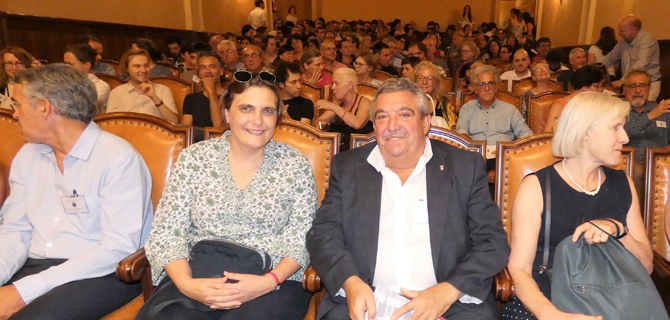Multilingualism is alive and well says, IANLS President and Warwick Professor, Ingrid De Smet – as is Latin!
 As President of the International Association for Neo-Latin Studies (IANLS), Professor Ingrid De Smet, of the University of Warwick’s School of Modern Languages and Cultures and Centre for the Study of the Renaissance, hosted, with fellow members of the Executive Committee and local organisers the society’s XVIIth International Congress.
As President of the International Association for Neo-Latin Studies (IANLS), Professor Ingrid De Smet, of the University of Warwick’s School of Modern Languages and Cultures and Centre for the Study of the Renaissance, hosted, with fellow members of the Executive Committee and local organisers the society’s XVIIth International Congress.
“Working in Neo-Latin Studies is both exciting and challenging”, says Professor De Smet, because you are always dealing with several reference frameworks at once: that of Classical Antiquity on the one hand, but also that of the contemporary socio-political scene, the religious history, and literary and technical developments, of (for example) fourteenth- and fifteenth-century Italy, sixteenth-century France, Scotland or Croatia, seventeenth-century Sweden, Schleswig, Tirol and so on. Petrarch and Boccaccio, Thomas More, Desiderius Erasmus, Andreas Vesalius and Gabriel Harvey all took recourse to Latin to reach international audiences with their writings.”
The IANLS investigates the literary, scientific and cultural dimensions of texts written in Latin (Neo-Latin) from the Renaissance to the present day. About 225 international delegates assembled in Albacete, from Finland, Latvia, and Estonia to Greece, from Poland and Portugal to Japan, from Mexico, Chili and the USA over the UK, Belgium, France, Germany and the Netherlands to Croatia, to discuss recent findings on, and ongoing research into, the rich and varied vein of writings in Latin – the lingua franca of the intellectual community as well as of diplomacy well before French, or later English took its place.
“Neo-Latin Studies is characterised by a spirit of exchange, collaboration and innovation which, of necessity, supersedes the traditional, discipline-based university structures: so a Classically trained Latin philologist may well be conversing with a historian of philosophy, a hispanist with a historian of the Counter Reformation, a specialist of Renaissance France or England with a living and breathing Latin poet. Neo-Latinists were practising interdisciplinary research well before it became fashionable”, says Professor De Smet.
“The beauty is that the body of Neo-Latin texts is incredibly prolific. So there is still so much for researchers to uncover, whilst the history of medicine, science, and technology, international relations and diplomacy, are in need of collaborators with the requisite, specialist language skills that Neo-Latinists offer.”
Strongly committed to its international and interdisciplinary character, the IANLS operates in six official languages: Latin, of course, as well as English, French, German, Italian and Spanish, all which were in evidence through the plenary lectures (with speakers from Granada, Milan, Freiburg, Paris and the Danish Academy in Rome), as well as in the President’s Opening Address, the IANLS Business Meeting, and Closing Ceremony.
The congress, whose central theme was Homines et natura: Artes et Scientiae in Litteris Neo-Latinis Traditae (‘Humanity and Nature: Arts and Sciences in Neo-Latin Literature’), was widely reported in the local press, including Spanish television. The IANLS congress enjoyed the hospitality and support of various entities within the University of Castilla-La Mancha, the Instituto de Estudios Albacetenses, the Diputación Provincial de Albacete, the municipalities of Albacete, Chincilla and Alcaraz, and the Ludwig Boltzmann Institute for Neo-Latin Studies, Innsbruck.
As well as giving a paper on ‘The Bird-Cather’s Wiles: Pietro Angeli da Barga’s De Aucupio [On Fowling]’, chairing a session on ‘Menippean Satire Three Ways’, and performing her presidential duties, Professor Ingrid De Smet also led an ‘Ask a Mentor’ event, a new initiative acknowledging the increasing numbers of early-career researchers in this burgeoning field.
Also present at Albacete were Dr Bobby Xinyue (British Academy Postdoctoral Fellow, Centre for the Study of the Renaissance) and Warwick alumni Dr Rocco di Dio (now at the Ludwig Boltzmann Institute for Neo-Latin Studies, Innsbruck) and Dr Giacomo Comiati (now at the University of Oxford).
The next IANLS congress will take place at the Katholieke Universiteit Leuven, in August 2021, to celebrate fifty years of Neo-Latin Studies since the first Neo-Latin conference ever was organised there in 1971. Professor Ingrid De Smet, herself a KUL alumna, will continue to serve as Past President on the IANLS Executive Committee until then, and she is determined to take many more Warwick representatives with her.
15 August 2018
Contact:
Tom Frew, Senior Press and Media Relations Manager – University of Warwick:
E: a dot t dot frew at warwick dot ac dot uk
M: +44(0)7785433155
